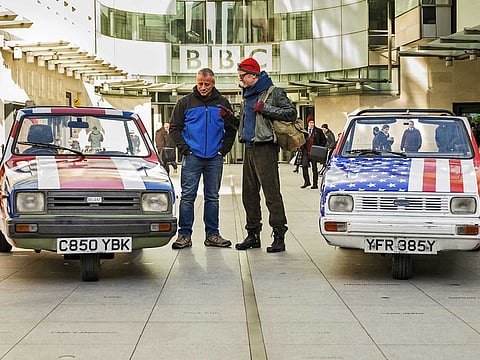Top Gear is back, and needs to slow down
The all-new Top Gear made its debut last night and straight away, there are problems

Dubai: The new-look Top Gear made its on-screen debut last night and, unless you have been living in a cave, you will have heard that it has not gone down very well at all.
From the outset it is impossible not to draw comparisons with the previous incarnation fronted by Jeremy Clarkson. Clarkson and producer Andy Wilman gave the BBC a golden egg, and anyone taking it on after their departure – which would have happened at one point eventually – was always going to face an issue.
Last night, Chris Evans and Matt Le Blanc helplessly tried to convince us that they are the right men to carry the show forward. The show was too quick and, while that might be solely down to Chris Evans’ presenting style, it was difficult to keep up. There was no chemistry or flow and the jokes were shoe-horned in rather cringingly.
It is the chemistry between the presenters that will decide Top Gear’s fate, not strictly the content. Last night we had a paintball fight between two Dodge Vipers on a US airfield, an off-road assault in an Ariel Nomad, and a city-to-city adventure in a pair of old Reliant three-wheelers which became a US-UK grudge match in a Willys Jeep and Land Rover Defender.
On paper, this content is no different to the escapades of Clarkson, Hammond and May – but the delivery was hard to embrace.
The rapport between Clarkson, Hammond and May is difficult to quantify, but one thing is certain: it didn’t happen from the off. When Top Gear was relaunched in 2002, Clarkson was relatively well-known in the UK, but was not really mainstream. For Richard Hammond, it was his first TV gig, and James May – who had replaced Clarkson in the old, old Top Gear in 1998 – didn’t join until series two.
Those early episodes (post-2002) were at a time when the global significance of Top Gear had not been realised. It was a BBC motoring show, with occasional adventures. It was not until 2005 when the wider world started to take notice and the BBC knew they had a winner on their hands.
However the chemistry between the presenters developed naturally over time – at no point was it simply added as an extra touch. It was this chemistry that ‘made’ the show. We did not care about the content because we knew whatever they did would work – and if it didn’t then so what, they didn’t care either.
This is Evans’ biggest problem with the new show: he cannot simply create a chemistry, even with the eye-watering budget provided to him by the BBC. That is not to say it cannot develop over time, but is the BBC going to grant him that luxury?
That depends on the viewing figures, and after looking at #TopGear on Twitter, things do not look good.
The fact that Evans was too quick and unfunny in his deliveries and links was exaggerated by the fact that he was doing bits and gags synonymous with Clarkson. Imitation is seldom well-received. The Star – or Stars – in a Rally Car (which was awkward and confusing with Gordan Ramsay and Jesse Eisenberg), the power laps, and even the introduction of the Stig were poor facsimiles of what we know.
By carrying these segments on, Evans has set himself up for a fall. It would be smart to bin the entire format and start again with a blank piece of paper.
Then there’s the business of presenters. On Sunday we only saw Evans, Le Blanc and Sabine Schmitz (who only featured in a film and not in the studio). The presence of American Le Blanc at times seemed awkward. He was acting: he was more Joey than himself. Le Blanc is not an experienced presenter, but you do get the feeling he will get to grips with it eventually. But the shoe-horned sign-off “And on that bombshell”, which was faux-interrupted by Evans, was a true hide-behind-the-sofa moment.
There is, however, a glimmer of hope.
As the credits rolled, we saw a short trailer presented by new-comer Rory Reid and motoring journalist Chris Harris introduce Extra Gear. Straight away the two – car savvy – men clicked. Almost in the same unquantifiable way as Clarkson, Hammond and May.
Perhaps going forward the BBC will review their approach, and rather than giving its prize jewel to the big name presenters and TV stars, give it to a couple of blokes who really love cars.
The last time they did that, it gave them the world’s most-popular show.



